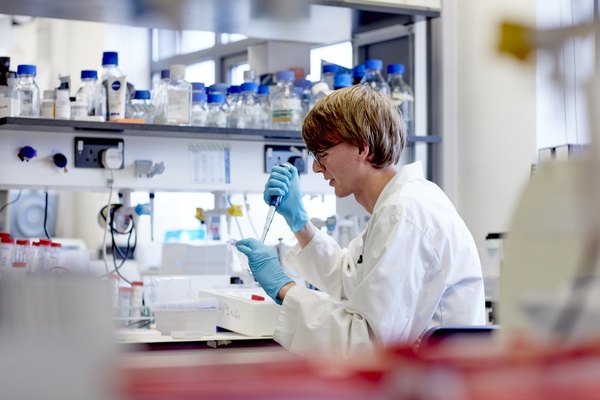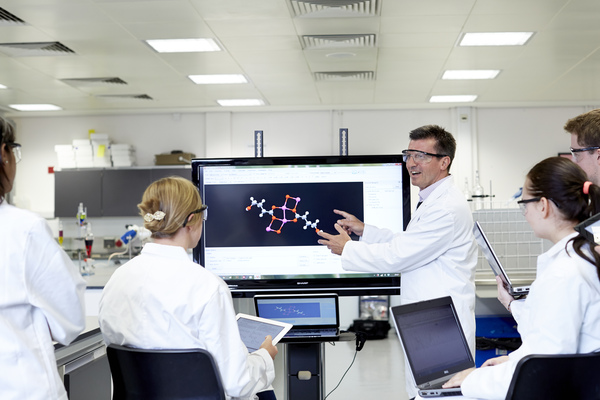Module Overview
This module will focus on process integration, carbon capture technology, and their simulation. Process integration will be carried out using the standardised 'problem table' algorithm, composite curves, and energy targeting techniques, using a spreadsheet package. Various carbon capture methods and their integration to process, and power plants will be explored. This module will also develop students' ability in directed group work to synthesising and designing sustainable chemical processes. Students can learn through examples and exercises. Additionally, students will be introduced to solve these problems using the Aspen ONE software suite and similar open-source software tools.
Module Overview
Students will undertake a major research or industrially based project, applying the management methods taught in their elective management module. Students are expected to solve an industrially relevant problem using a combination of analytical, experimental, and modelling skills.
The specific content of each project will vary, but in general, the projects will contain both ‘research’ and ‘design’ components. Research will involve analytical, computational, and experimental aspects. Design work will contain specification, design, analysis, manufacture and test work. All project must be conducted with reference to environmental and sustainability issues, and account for commercial, strategic, and risk issues that would be involved in implementing their design solution within an engineering business.
Module Overview
The aim of this module is to provide an overview of the management of projects throughout the project life-cycle, from concept to beneficial operation. Business has long recognised the imperative for good, integrated processes in order to extract best value from capital investments; this course explores the benefits and imperatives for adopting a Capital Value Process for selecting the right projects to deliver required business goals, and for establishing robust Project Execution Plans for delivering world class results, as well as facilitating executive control at all stages throughout the project lifecycle. The student will compare and contrast the differing emphases and approaches to project delivery for several professional bodies and will be introduced to ten key project principles which underpin world class project performance across a broad range of industry sectors. They will also practise using several strategic planning tools to aid objective decision making and option screening. Importantly, the course will establish the imperative of good health, safety and environmental performance as a business value. It is not the intention of this module to teach project technical skills, such as planning, estimating or contract administration, but more to equip future project managers with a broad range of skills and competences so that, armed with the core project principles they might harness the skills of a diverse team of project professionals in developing and executing major projects, programmes and portfolios of the future.
Module Overview
This module aims to equip students with the principles and skills related to the design and integration of chemical processes, emphasising the conceptual issues that are fundamental to the creation of the process. The module is intended to provide a practical guide to chemical process design and integration. It is envisaged that it will be useful for practicing process designers and chemical engineers and applied chemists working in process development. Students will learn through examples and exercises that will do not require specialist software and can be performed on spreadsheet software. However, for efficiency, students will be encouraged to solve these problems using Aspen ONE software suite and similar open-source software tools.
Module Overview
In the global contemporary setting, ethical and sustainable practice are a key focus within all aspects of business and in particular the responsible approach and management of the supply chain network. The Chartered Institute of Procurement and Supply recognise that the global supply chain sector has a moral obligation to do better in the fight against modern slavery, intolerable working conditions as well as bribery and corruption. Equally, the supply network of organisations is estimated to be responsible for as much as 90% of harmful emissions that are damaging our planet. As such, supply chain activities are identified as a primary concern in the global pursuit to reduce greenhouse gas and many other damaging emissions to decrease the negative impact of climate change and human activity. Therefore, responsible supply chain strategy is gaining direct attention and is recognised as a major evolving challenge for many organisations as they strive to meet their moral, legal, and humanistic aspirations and targets to ensure a prosperous future for all and as such, organisational recognition as a responsible global citizen.
Module Overview
The module provides you with an opportunity to develop knowledge and skills across strategic and P3 management: to articulate and execute a suitable organisational strategy and manage any change initiative to effectively deliver complex business solutions or improvements. The key aim of this module is to deepen an understanding of strategic aspects of project management and governance within organisations and develop your ability to align change with organisational purpose and strategy. Emphasising the significance of programme and portfolio management as well as project governance and assurance, the designed syllabus aims to enable you to prioritise and manage multiple and often interdependent projects to accomplish strategic and project objectives.
Module Overview
This module deals with current and potential future energy systems, covering resources, extraction, conversion, and end-use technologies, with emphasis on meeting regional and global energy needs in the 21st century in a sustainable manner. The course includes the review of various renewable and conventional energy production technologies, energy end-use practices and alternatives, and consumption practices in different countries. Students are given the opportunity to learn a quali-quantitative framework to aid in evaluation and analysis of energy technology system proposals in the context of engineering, political, social, economic, and environmental goals.
Module Overview
The aim of this module is to enhance the students’ decision capabilities when confronted with strategic or operational choices. Students will have the opportunity to learn how decision analysis tools can be used to structure and analyse decision problems and how a mix of data and judgement can help decision makers to better achieve their objectives.
Module Overview
In order to ensure organisational success, we must seek to manage relationships with upstream and downstream suppliers and customers to deliver increased customer value at less cost to the supply chain overall. It is often argued that an organisation is only as a good as its supply chain and that the global supply chain can be a key source of competitive advantage. In the age of globalisation, many organisations are only as good as their global supply chains. Global supply chains give the organisation access to strategic resources and enable them to compete in global markets. Procurement and Supply Chain Management as a discipline has changed considerably in many companies and organisations in the recent past. Considering the amount of money generally involved in the preparation and execution of procurement and supply decisions, this is not a surprise and it has been argued that an effective and efficient operating purchasing and supply function can make an important contribution to company results and also add significant value. Traditionally, the procurement department has acted as the intermediary which negotiates the agreements and contracts with suppliers and subsequently monitors their compliance to those agreements. However, this ‘traditional’ role is changing rapidly and procurement and supply chain managers are assuming more strategic roles within organisations, focused on achieving better performance from suppliers though approaches such as more active management of supplier relationships.
Module Overview
This research methods module aims to prepare students for undertaking the research for their Independent Study. It reviews core principles of the research methods that students are likely to utilise in their research. The chosen method should form the basis of their research design, and the structure of the of Independent Study submission.
Module Overview
This module aims to provide you with an understanding of how to create and sustain high-performing teams. Through a review of existing and emerging theories and models of leadership, team formation, motivation, communication, power, and diversity, you can gain theoretically sound knowledge of team behaviour and effectiveness. A variety of engaging practical exercises seek to enable you to develop you skills as an effective and empathetic team leader and valuable team member.




